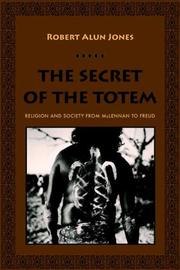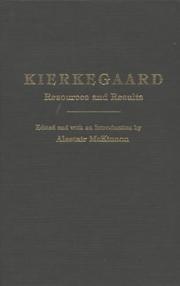| Listing 1 - 5 of 5 |
Sort by
|
Periodical
Abstract | Keywords | Export | Availability | Bookmark
 Loading...
Loading...Choose an application
- Reference Manager
- EndNote
- RefWorks (Direct export to RefWorks)
African American newspapers --- African Americans --- Waco (Tex.) --- McLennan County (Tex.) --- Texas. --- Texas --- Texas

ISBN: 023113438X 0231508778 9780231508773 9780231134385 Year: 2005 Publisher: New York Columbia University Press
Abstract | Keywords | Export | Availability | Bookmark
 Loading...
Loading...Choose an application
- Reference Manager
- EndNote
- RefWorks (Direct export to RefWorks)
Though it is now discredited, totemism once captured the imagination of Sigmund Freud, Émile Durkheim, James Frazer, and other prominent Victorian thinkers. In this lively intellectual history, Robert Alun Jones considers the construction of a theory and the divergent ways religious scholars, anthropologists, psychoanalysts, and cultural theorists drew on totemism to explore and define primitive and modern societies' religious, cultural, and sexual norms. Combining innovative readings of individual scholars' work and a rich portrait of Victorian intellectual life, Jones brilliantly traces the rise and fall of a powerful idea. First used to describe the belief systems of Native American tribes, totemism ultimately encompassed a range of characteristics. Its features included belief in a guardian spirit that assumed the form of an a particular animal; a prohibition against marrying outside the clan combined with a powerful incest taboo; a sacrament in which members of the totemic clan slaughtered a representative of the totemic species; and the tracing of descent through the female rather than the male. These attributes struck a chord with the late Victorian mentality and its obsession with inappropriate sexual relations, evolutionary theory, and gender roles. Totemism represented a set of beliefs that, though utterly primitive and at a great evolutionary distance, reassured Victorians of their own more civilized values and practices. Totemism's attraction to Victorian thinkers reflects the ways in which the social sciences construct their objects of study rather than discovering them. In discussing works such as Freud's Totem and Taboo or Frazer's The Golden Bough, Jones considers how theorists used the vocabulary of totemism to suit their intellectual interests and goals. Ultimately, anthropologists such as A. A. Goldenweiser, Franz Boas, and Claude Lévi-Strauss argued that totemism was more a reflection of the concerns of Victorian theorists than of the actual practices and beliefs of "primitive" societies, and by the late twentieth century totemism seemed to have disappeared altogether.
Totemism. --- Endogamy and exogamy --- Ethnology --- Mythology --- Religion --- Taboo --- animal worship --- self-transcendence --- neurosis --- religion and society --- McLennan --- Freud --- totemism
Periodical
Abstract | Keywords | Export | Availability | Bookmark
 Loading...
Loading...Choose an application
- Reference Manager
- EndNote
- RefWorks (Direct export to RefWorks)
African American newspapers --- African Americans --- African American newspapers. --- African Americans. --- Waco (Tex.) --- McLennan County (Tex.) --- Texas. --- Texas --- Texas
Book
ISBN: 1800731590 9781800731585 9781800731578 1800731574 1800731582 Year: 2021 Publisher: New York, New York : Berghahn,
Abstract | Keywords | Export | Availability | Bookmark
 Loading...
Loading...Choose an application
- Reference Manager
- EndNote
- RefWorks (Direct export to RefWorks)
The life and career of one of anthropology’s most important ancestors, William Robertson Smith in the context of the history of anthropology. William Robertson Smith’s influence on anthropology ranged from his relationship with John Ferguson McLennan, to advising James George Frazer to write about “Totem” and “Taboo” for the Encyclopaedia Britannica that he edited. This biography places a special emphasis on the notes and observations from his travels to Arabia, as well as on his influence on the representatives of the “Myth and Ritual School.” With his discussion of myth and ritual, Smith influenced generations of scholars, and his insistence on the connection between the people, their God, and the land they inhabited inspired many of the concepts later developed by Émile Durkheim. “This is a clear, well-informed and interesting account of Robertson Smith’s central ideas. The theories are set in the context of debates of the day, and their influence on anthropology and bible studies is discussed. An original and fascinating section reviews Robertson Smith’s field work in the Middle East, which was much more extensive and intensive than is, I think, generally appreciated.”—Adam Kuper, London School of Economics From the introduction: Although respected and studied, especially since the 1990s, Smith has a somewhat paradoxical position in the history of social and cultural anthropology. Anthropologists educated in the twentieth century admire him, but many contemporary scholars are not quite sure what to make of him.
Myth and ritual school. --- Anthropology of religion --- Anthropologists --- History --- James George Frazer. --- John Ferguson McLennan. --- William Robertson Smith. --- anthropologist. --- anthropology. --- biography. --- durkheim. --- folklore. --- myth. --- ritual. --- social anthropology. --- sociology. --- Émile Durkheim. --- Myth --- Ritual --- Scientists --- Religious anthropology --- Ethnology --- Study and teaching --- Anthropologists - Scotland - 19th century - Biography --- Anthropology of religion - History - 19th century --- Myth and ritual school --- Orientalism --- Smith, William Robertson, - 1846-1894 --- Smith, W. Robertson --- Smīth, Rūbirtsūn, --- Smith, William Robertson,

ISBN: 0919401023 0889201269 9780889201262 9780919401020 0889206996 9780889206991 9780889201026 9781554585434 1554585430 Year: 1982 Publisher: [Waterloo, Ont.] Wilfrid Laurier University Press
Abstract | Keywords | Export | Availability | Bookmark
 Loading...
Loading...Choose an application
- Reference Manager
- EndNote
- RefWorks (Direct export to RefWorks)
Recently, a conference of scholars considered resources and results in Kierkegaard research. In part one, "Resources," J.C. McLelland gives a short account of the acquisition of the Malantschuk collection by McGill University, H.P. Rohde discusses the collection as a basis for research, and H. Möller comments on its accessibility to scholars. N.J. Cappelørn examines the importance of the Papirer as a resource. In part two, "Results," H.V. Hong analyzes Kierkegaard's concept of "Thought-Experiment," relating it to Kierkegaard translation. J. Walker elucidates four of Kierkegaard's assumptions concerning communication and notes the difficulties these pose for creating real human community. M. Cargignan's paper presents the concept of the "eternal" as a synthesizing force acting upon body, soul, and spirit. H.A. Nielsen distinguishes between two levels of indirect communication in Mark 6:45-52 and calls attention to the significance of this distinction for understanding Kierkegaard. The last two essays present the results of computer research at McGill: A.H. Khan explores the concept of passion in Concluding Unscientific Postscript, and A. McKinnon offers a spatial representation of the relations among Kierkegaard's thirty-four works. The volume, containing responses by R.L. Perkins, R. Archer, P. Carpenter, D. Lochhead, D. Goicoechea, and R. Johnson, will be of interest to Kierkegaard, Philosophy, and religion scholars, and those engaged in computer research in the humanities.
Kierkegaard, Sören, --- Congresses --- Library resources --- Kierkegaard-Malantschuk Collection --- Kierkegaard, Soren --- -Congresses --- -Anti-climacus --- H. H. --- Kierkegaard, Sören, --- Kierkegaard, Søren, --- Kierkegaard, Søren --- Anti-climacus --- Congresses. --- Collection Kierkegaard-Malantschuk --- McLennan Library. --- Gregor Malantschuk Søren Kierkegaard Collection --- Anti-Climacus, --- Bogbinder, Hilarius, --- Chʻi-kʻo-kuo, --- Climacus, Johannes, --- Constantius, Constantin, --- Eremita, Victor, --- Haufniensis, Vigilius, --- Johannes, Climacus, --- Johannes de Silentio, --- Kʹerkegor, Seren, --- Kierkegaard, S. --- Kierkegaard, Severino, --- Kierkegaard, Søren Aabye, --- K'i︠e︡rkegor, Sʹoren, --- Kīrkajūrd, Sūrīn, --- Kirkegaard, Soeren, --- Kirkegor, Seren, --- Ḳirḳegor, Sern, --- Kirkegors, Sērens, --- Kirukegōru, Søren, --- Kjerkegor, Seren, --- Kʻo-erh-kʻai-ko-erh, --- Notabene, Nicolaus, --- Silentio, Johannes de, --- Sūrīn Kīrkajūrd, --- Victor, Eremita, --- Vigilius, Haufniensis, --- קירקגור, סרן --- קירקגור, סורן --- קירקגור, סירן --- קירקגור, סירן, --- קירקגורד, סרן, --- 克尓凯郭尓, --- Philosophy, Danish. --- Kierkegaard, Sren,
| Listing 1 - 5 of 5 |
Sort by
|

 Search
Search Feedback
Feedback About UniCat
About UniCat  Help
Help News
News